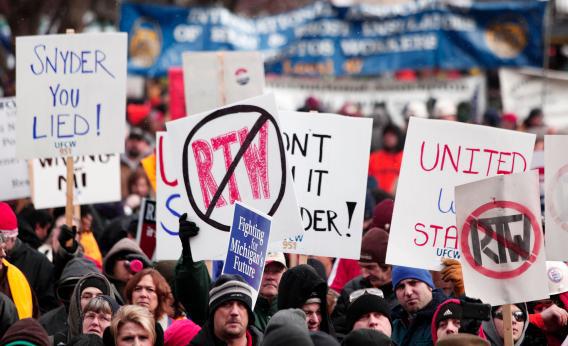In terms of practical economic impacts, I think the right-to-work controversy set off by Michigan Gov. Rick Snyder’s decision to undertake a lame duck flip-flop is perhaps overstated. If you compare Montgomery County in labor-friendly Maryland to Fairfax County in right-to-work Virginia, your overwhelming impression will be that these are very similar affluent suburbs of the same city. But apples-to-apple comparisons are hard to find and since union rules are highly correlated with other political indicators it’s easy to cherry pick points. The conservative parts of America are generally poorer than the liberal parts, but also faster-growing. So if you want to claim that right-to-work laws are immiserating or growth-friendly, you can help yourself to whatever statistics you like.
But what’s not murky is the absurd hypocrisy that has to go into making the case for right-to-work legislation.
The way this works is that if there’s a labor union at a given business establishment that’s bargaining for some higher pay or benefits or better work-rules or whatever it’s rapidly going to find that there’s a free rider problem. Everyone in the relevant class of workers gets the benefits whether or not they join the union. So something the union is often going to want to bargain for is some kind of rule stating that everyone hired in the relevant class has to join the union, or has to pay dues to the union, or something else along those lines.
Now naturally an employer’s not going to want to agree to that. But he’s not going to want to agree to higher pay or more vacation days either. That’s why it’s a negotiation. A right-to-work law is a law banning employers from making that concession.
The impact, obviously, is to make it hard to form strong unions in a given jurisdiction and thus make it a more business-friendly jurisdiction. But note that this same trick works across the board. You could just ban pay raises in general. Any one firm, after all, faces a dilemma. On the one hand it would be more profitable to pay people less. On the other hand, it’s also unprofitable to have everyone quit to go work for some other higher-paying company. So a law against pay raises would make everyone more profitable, spurring crazy business investment and job creation. Except nobody does that because it would be (a) insane and (b) obviously unfair. And yet the proponents of right-to-work laws are generally exactly the people most inclined to stand up for freedom of contract under other circumstances.
